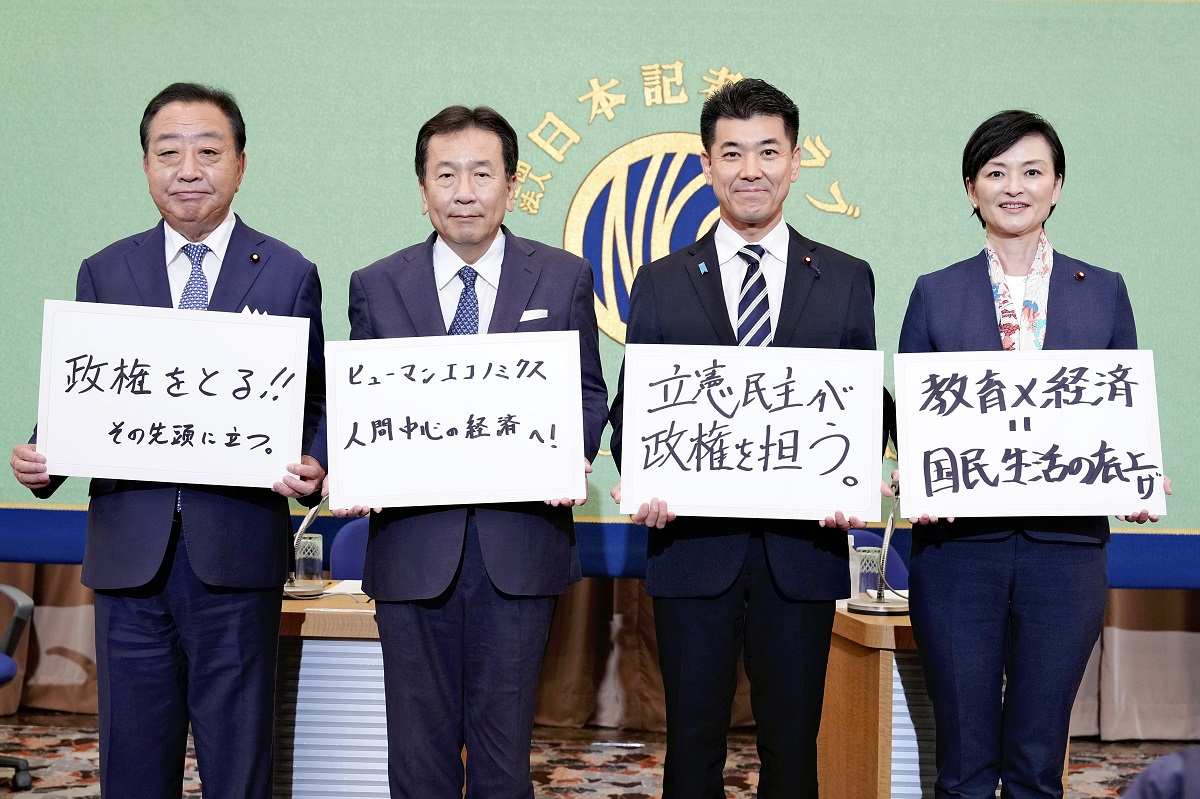Candidates in CDPJ Leadership Race Present Different Policy Views About How to Treat Nuclear Power Plants, Consumption Tax

From left: Former Prime Minister Yoshihiko Noda, former party President Yukio Edano, current party President Kenta Izumi and House of Representatives member Harumi Yoshida show their respective slogans at a CDPJ presidential election debate in Chiyoda Ward, Tokyo, on Saturday.
16:26 JST, September 9, 2024
The Constitutional Democratic Party of Japan likens its party presidential election to a “semi-final match” of a sports tournament and sees the next Diet general election as the final match.
The party aims to demonstrate that it has the ability to hold the reins of government through policy debates by candidates in the leadership race.
However, during a debate on Saturday, there were many scenes in which the candidates’ stances became less sharp partly because they might have been conscious about the reality.
An increasing number of CDPJ members have voiced concern that the party leadership race may be eclipsed by the Liberal Democratic Party’s presidential election, which is scheduled for a period similar to the CDPJ’s.
At the debate, the candidates also discussed realizing a society not dependent on nuclear energy as a basic policy of the party.
Former Prime Minister Yoshihiko Noda, who decided to allow the reactivation of the Ohi nuclear power station of Kansai Electric Power Co. in Fukui Prefecture in 2012 when he was prime minister, said, “The question is how to proceed with realistic policies while continuing to raise ideals.”
Kenta Izumi showed his stance to tolerate the reactivation of reactors at Tokyo Electric Power Company Holdings, Inc.’s Kashiwazaki-Kariwa nuclear power station in Niigata Prefecture.
“Concerning reactors that will have cleared all of the hurdles, which include checks on safety measures, consent from local people and evacuation plans in the event of an emergency, I think they should be allowed to be restarted.”
Yukio Edano showed his stance that the party’s basic policies do not need to be reviewed saying, “A society that does not rely on nuclear power plants can be realized early.”
Harumi Yoshida said, “I’m aiming for a society without nuclear power plants.”
Another focus was how to treat the consumption tax reform about which CDPJ members have different levels of enthusiasm.
Edano and Noda were negative about lowering the consumption tax rate.
Edano said, “If the rate is lowered, the beneficial effects will also be enjoyed by wealthy people who pay high amounts of taxes.”
Noda said, “If the standard tax rate is decreased, [the government’s] tax revenues will fall. Once the rate is lowered, it will be very difficult to increase it again.”
The two have insisted that a refundable tax credit system should be introduced for low-income earners.
Yoshida proposed lowering the consumption tax rate to 5% as a limited-term measure and exempt food from the consumption tax. Izumi expressed his intention to consider some measure to lower the tax burden.
A veteran member of the CDPJ expressed concern saying, “As long as basic views on national issues differ so widely, voters will not give us the reins of government.”
The person added, “I want the next party president to unite party members through debate battles during the leadership election campaigns.”
Top Articles in Politics
-

Japan PM Takaichi’s Cabinet Resigns en Masse
-

Sanae Takaichi Elected Prime Minister of Japan; Keeps All Cabinet Appointees from Previous Term
-

Japan’s Govt to Submit Road Map for Growth Strategy in March, PM Takaichi to Announce in Upcoming Policy Speech
-

LDP Wins Historic Landslide Victory
-

LDP Wins Landslide Victory, Secures Single-party Majority; Ruling Coalition with JIP Poised to Secure Over 300 seats (UPDATE 1)
JN ACCESS RANKING
-

Producer Behind Pop Group XG Arrested for Cocaine Possession
-

Japan PM Takaichi’s Cabinet Resigns en Masse
-

Man Infected with Measles Reportedly Dined at Restaurant in Tokyo Station
-

Israeli Ambassador to Japan Speaks about Japan’s Role in the Reconstruction of Gaza
-

Videos Plagiarized, Reposted with False Subtitles Claiming ‘Ryukyu Belongs to China’; Anti-China False Information Also Posted in Japan





















